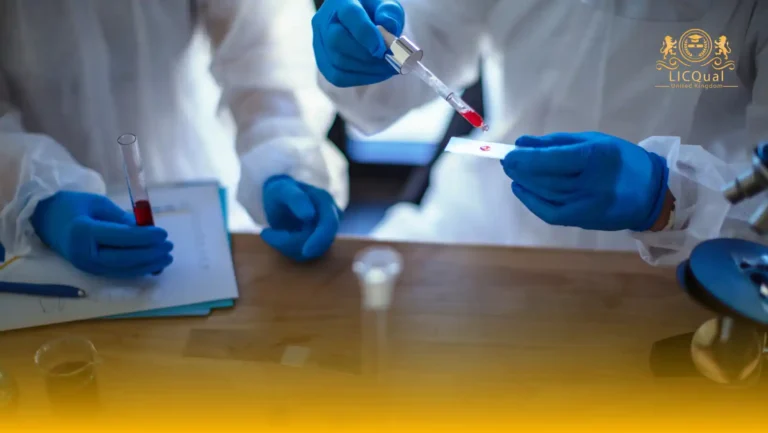The LICQual Level 3 Certificate in Clinical Nutrigenomics (Cert Nutrigenomics) is a specialised qualification designed for learners seeking to advance their knowledge and expertise in the emerging field of nutrigenomics. This course is ideal for professionals who wish to enhance their career prospects, expand their scientific understanding, and maintain high standards in Continuing Professional Development (CPD).
Learners will gain in-depth knowledge of how genetic variations influence individual responses to nutrients and diet, and how this information can be applied to personalised nutrition strategies. The programme equips learners with practical and theoretical skills to interpret genetic data, understand gene–diet interactions, and apply evidence-based recommendations in clinical or wellness settings.
Centres offering this qualification are required to maintain the highest standards of training, ensuring learners are supported by competent and qualified staff. In addition, centres must provide all essential learning materials, digital resources, and practical tools to deliver a high-quality educational experience. This ensures learners are able to engage fully with the course content and achieve successful outcomes.
By completing the LICQual Level 3 Certificate in Clinical Nutrigenomics, learners will be well-prepared to integrate nutrigenomic insights into professional practice, contribute to personalised health and nutrition initiatives, and demonstrate professional excellence. This qualification provides a valuable foundation for those committed to advancing their careers in nutrition, dietetics, healthcare, and wellness industries.
Course Overview
Qualification Title
LICQual Level 3 Certificate in Clinical Nutrigenomics (Cert Nutrigenomics)
Total Units
6
Total Credits
24
GLH
120
Qualification #
LICQ2201007
Qualification Specification
To enroll in the LICQual Level 3 Certificate in Clinical Nutrigenomics (Cert Nutrigenomics) , applicants must meet the following criteria:
|
Qualification# |
Unit Title |
Credits |
GLH |
|---|---|---|---|
|
LICQ2201007-1 |
Fundamentals of Nutrigenomics |
4 |
20 |
|
LICQ2201007-2 |
Human Nutrition and Gene-Diet Interactions |
4 |
20 |
|
LICQ2201007-3 |
Nutrigenomic Testing and Interpretation |
4 |
20 |
|
LICQ2201007-4 |
Applied Nutrigenomics in Clinical Practice |
4 |
20 |
|
LICQ2201007-5 |
Ethical, Legal and Regulatory Considerations |
4 |
20 |
|
LICQ2201007-6 |
Research, Analysis and Communication in Nutrigenomics |
4 |
20 |
By the end of this course, learners will be able to:
Unit 1: Fundamentals of Nutrigenomics
By the end of this unit, learners will be able to:
- Explain the basic principles of genetics, genomics, and epigenetics relevant to nutrition.
- Analyse how genetic variations influence individual metabolic responses to nutrients.
- Evaluate the relationship between genes, environment, and dietary factors in health and disease.
- Apply foundational knowledge of nutrigenomics to professional practice scenarios.
Unit 2: Human Nutrition and Gene-Diet Interactions
By the end of this unit, learners will be able to:
- Describe the role of macro- and micronutrients in maintaining health and wellbeing.
- Assess the impact of genetic variations on nutrient absorption, metabolism, and dietary requirements.
- Examine how personalised nutrition can prevent or manage diet-related health conditions.
- Interpret dietary guidelines in the context of individual genetic profiles.
Unit 3: Nutrigenomic Testing and Interpretation
By the end of this unit, learners will be able to:
- Explain the methodologies used in nutrigenomic testing and their applications.
- Analyse genetic test results to identify nutrient-gene interactions.
- Evaluate the limitations and reliability of nutrigenomic data in clinical practice.
- Apply nutrigenomic information to design evidence-based personalised nutrition recommendations.
Unit 4: Applied Nutrigenomics in Clinical Practice
By the end of this unit, learners will be able to:
- Develop personalised nutrition plans based on individual genetic profiles.
- Integrate nutrigenomic principles into professional practice and client care.
- Monitor and evaluate the effectiveness of dietary interventions informed by genetic data.
- Demonstrate professional judgement when applying nutrigenomic knowledge to practical scenarios.
Unit 5: Ethical, Legal and Regulatory Considerations
By the end of this unit, learners will be able to:
- Identify ethical issues associated with genetic testing and personalised nutrition.
- Explain legal and regulatory requirements related to data protection, consent, and professional practice.
- Evaluate the responsibilities of practitioners when providing nutrigenomic guidance.
- Apply ethical principles to ensure safe, responsible, and professional practice in nutrigenomics.
Unit 6: Research, Analysis and Communication in Nutrigenomics
By the end of this unit, learners will be able to:
- Conduct research using reliable sources and appropriate methods in nutrigenomics.
- Analyse and interpret genetic and nutritional data to draw evidence-based conclusions.
- Communicate nutrigenomic information effectively through reports, presentations, and consultations.
- Demonstrate critical thinking and professional judgement in evaluating and applying research findings.
The LICQual Level 3 Certificate in Clinical Nutrigenomics (Cert Nutrigenomics) is designed for healthcare professionals, dietitians, genetic counselors, and students who want to explore the powerful connection between nutrition and genetics. This internationally recognized Clinical Nutrigenomics Level 3 qualification is perfect for anyone seeking accredited training, career advancement, or specialized knowledge in personalized nutrition. Whether you are starting your journey or enhancing existing skills, this program provides the right pathway to make a lasting impact in healthcare, nutrition, and genetic science.
Healthcare Professionals
- Doctors and physicians aiming to integrate nutrigenomics into patient care strategies
- Nurses supporting recovery and wellness through personalized nutrition interventions
- Pharmacists interested in nutrition’s role in genetic health and disease prevention
- Allied health workers expanding expertise with Clinical Nutrigenomics Level 3 qualification
- Hospital staff seeking accredited Clinical Nutrigenomics certificates for career growth
Aspiring Nutrigenomics Specialists
- Students preparing for careers in genetics, nutrition, and healthcare management
- Learners wanting to become certified Clinical Nutrigenomics specialists
- Individuals searching for the best Clinical Nutrigenomics certificate for healthcare careers
- Those seeking flexible online Clinical Nutrigenomics training programs
- Graduates aiming for higher diplomas or degrees in nutrigenomics and personalized nutrition
Dietitians and Nutritionists
- Dietitians interested in applying genetic insights to nutrition planning
- Nutritionists seeking accredited Clinical Nutrigenomics certification for career advancement
- Professionals designing personalized diet plans based on genetic profiles
- Practitioners aiming to strengthen their expertise in advanced nutrition science
- Specialists preparing for leadership roles in clinical nutrition and nutrigenomics
Public Health and NGO Workers
- Professionals working in NGOs or community health programs
- Public health educators promoting nutrigenomics awareness in population health initiatives
- Social workers supporting families with personalized nutrition strategies
- Policy makers interested in evidence‑based nutrigenomics approaches
- Trainers delivering nutrigenomics sessions in community health programs
Genetic Counselors and Researchers
- Genetic counselors integrating nutrition into genetic health consultations
- Researchers exploring the impact of nutrigenomics on chronic disease prevention
- Professionals conducting studies on gene‑diet interactions and personalized nutrition
- Scientists seeking accredited Clinical Nutrigenomics qualifications for research credibility
- Academics preparing for advanced nutrigenomics and healthcare leadership roles
International Learners
- Students in the UK, Middle East, and Asia seeking accredited Clinical Nutrigenomics certificates
- Professionals needing globally recognized qualifications for career mobility
- Learners searching for online Clinical Nutrigenomics diplomas with flexible study options
- Healthcare workers abroad aiming to strengthen their professional profile
- International candidates preparing for advanced nutrigenomics and personalized nutrition studies
Continuing Professional Development (CPD) Seekers
- Professionals needing CPD credits in healthcare and nutrigenomics research
- Medical staff updating knowledge with accredited Clinical Nutrigenomics training
- Nutrition advisors enhancing qualifications for career growth
- Educators seeking structured CPD in nutrigenomics and health sciences
- Practitioners aiming to stay current with global nutrigenomics standards
To deliver the LICQual Level 3 Certificate in Clinical Nutrigenomics, centres must meet the following standards to ensure high-quality training and learner success:
- Qualified and Competent Staff – Centres must employ tutors and assessors with recognised qualifications in nutrigenomics, nutrition, genetics, or related scientific disciplines, along with relevant professional experience to guide learners effectively.
- Comprehensive Learning Resources – Centres should provide learners with access to up-to-date textbooks, scientific journals, digital resources, and practical tools necessary for completing all units of the course.
- Practical Training Facilities – Centres must have access to suitable facilities, including laboratories or demonstration areas, to support practical learning activities and applied nutrigenomic exercises.
- Assessment and Feedback Systems – Centres must implement robust assessment procedures, including formative and summative evaluations, and provide timely, constructive feedback to support learner progress.
- Health and Safety Compliance – Centres are required to maintain high standards of health and safety in all learning environments, ensuring that learners can engage in practical and laboratory activities safely.
- Commitment to Continuing Professional Development (CPD) – Centres should encourage both staff and learners to engage in CPD activities to remain current with scientific developments in nutrigenomics and personalised nutrition.
- Quality Assurance Processes – Centres must have effective monitoring and evaluation systems to ensure consistent course delivery, adherence to LICQual standards, and continuous improvement of teaching and learning.
By fulfilling these requirements, centres create a professional, supportive, and resource-rich learning environment that enables learners to successfully achieve the LICQual Level 3 Certificate in Clinical Nutrigenomics, enhancing their expertise, career prospects, and professional credibility.
Assessment and Verification
All units within this qualification are subject to internal assessment by the approved centre and external verification by LICQual. The qualification follows a criterion-referenced assessment approach, ensuring that learners meet all specified learning outcomes.
To achieve a ‘Pass’ in any unit, learners must provide valid, sufficient, and authentic evidence demonstrating their attainment of all learning outcomes and compliance with the prescribed assessment criteria. The Assessor is responsible for evaluating the evidence and determining whether the learner has successfully met the required standards.
Assessors must maintain a clear and comprehensive audit trail, documenting the basis for their assessment decisions to ensure transparency, consistency, and compliance with quality assurance requirements.







